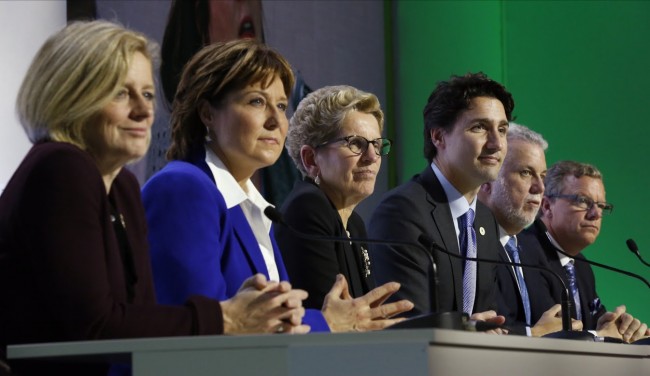
Majority of Canadians support price on carbon, poll shows
by Bruce Cheadle, The Canadian Press

Debate over whether or not to ratify last year's Paris climate accord to take place in House of Commons this week

Part of the Canadian delegation at the COP21 conference in Paris last year. PHOTO: Government of Canada
MONTREAL—Canada’s federal, provincial and territorial environment ministers will take a first crack today at hashing out a national plan for meeting the country’s international climate commitments.
The long-awaited meeting in Montreal comes almost a year after Justin Trudeau’s Liberals won a majority mandate on a green election platform that included pricing carbon.
And it comes as a debate in the House of Commons gets underway today leading to a vote by MPs on Wednesday as to whether Canada should formally ratify last year’s Paris climate accord at the United Nations.
A new public opinion survey suggests there’s a reservoir of good will for federal leadership, including majority backing for a minimum national price on CO2 emissions.
In the telephone poll conducted by Nanos Research and sponsored by think tank Clean Energy Canada, 77 percent of respondents supported or somewhat supported creating a national plan in order to achieve the carbon cuts Canada agreed to under the Paris accord.
And among the 1,000 survey respondents, 59 per cent supported or somewhat supported pricing emissions, with 62 per cent saying they’d support a minimum carbon price that applies across the country.
The poll, conducted Sept. 24-27, is considered accurate within plus or minus 3.1 percentage points, 19 times out of 20.
But no public opinion survey can paper over the deep divisions within the provincial and territorial ministers meeting today at a hotel in downtown Montreal.
Federal Environment Minister Catherine McKenna continues to maintain that placing a price on CO2 is part of the mix, even as various provinces raise objections.
“We know carbon pricing is a really important part of how we’re going to reduce emissions … and so I’m looking forward to a path forward as we lead into the meeting of the first ministers,” McKenna said last week in Ottawa.
A date has yet to be nailed down for when Prime Minister Trudeau will meet with the premiers to finalize a pan-Canadian plan this fall, and provincial environment ministers made it clear heading into today’s meeting that there’s still a lot of negotiating ahead.
Saskatchewan’s Scott Moe says it would be “very problematic and challenging” for his province to adopt a carbon tax given its heavy reliance on price-sensitive commodity exports.
But the push-back on a nationally imposed floor price extends even to provinces that are already moving ahead with cap-and-trade markets that place a price on emissions.
Provincial ministers say a federal-provincial working group of officials that spent the summer looking at carbon pricing failed to reach a consensus on how to equate direct carbon taxes, such as British Columbia’s, to cap-and-trade carbon markets like the one Quebec is developing with Ontario.
David Heurtel, the Quebec environment and climate minister who will chair today’s meeting, told The Canadian Press that every province has to pull its own weight—and develop its own policies.
That was what the premiers agreed to last March in Vancouver when they signed a common declaration with the prime minister to pursue “market mechanisms” for pricing emissions, said Heurtel.
“We have very serious issues with a national price or any national standard that would adversely affect existing systems like the Quebec-Ontario cap-and-trade system,” said Heurtel.
McKenna was emphatic during a recent trip to a climate conference in New York that either a direct carbon tax or a cap-and-trade market were the only viable options for provinces to price greenhouse gas emissions. And federal officials behind the scenes continue to talk a tough game, saying a pan-Canadian plan will be in place by year’s end and it will include pricing emissions.
Working papers from four groups of officials will be released today as part of the ministerial talks, dealing with climate adaptation, mitigation measures, clean technology investment and pricing mechanisms.
But for anyone hoping to see the clear outlines of a pan-Canadian plan when the meeting concludes, B.C. minister Mary Polack said “that may be a misplaced expectation based on where we are in the process.”